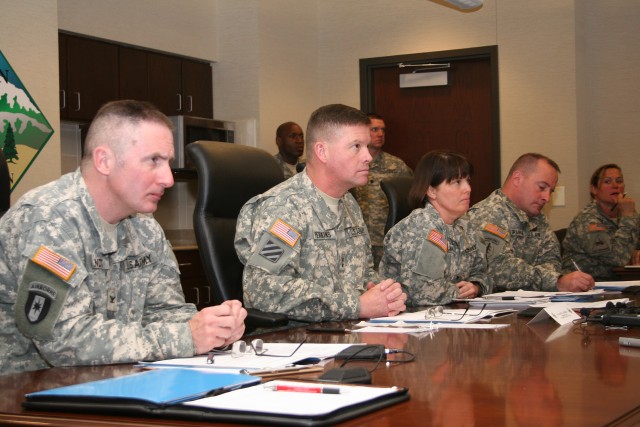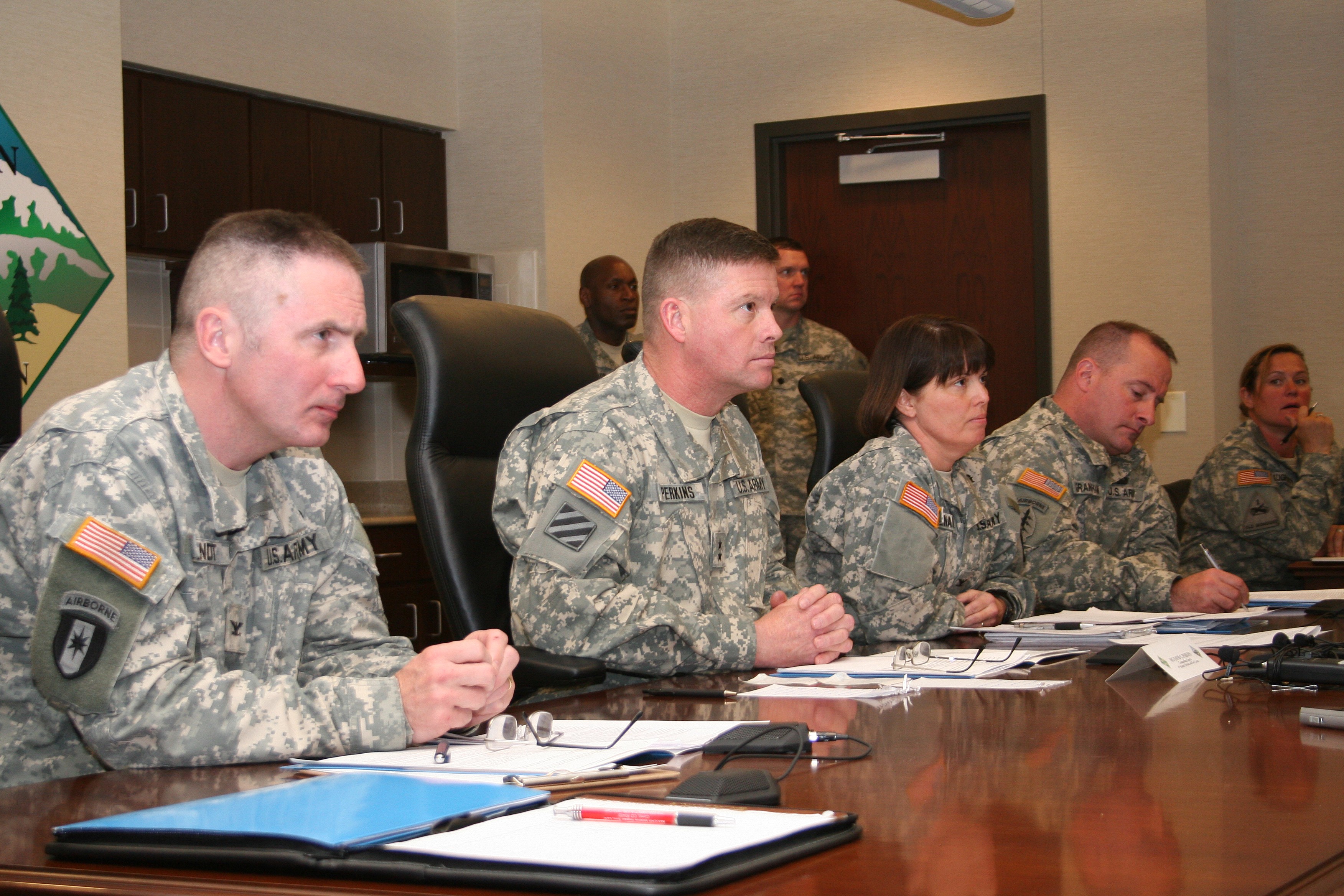
FORT CARSON, Colo.---More than 80 percent of the Army's war-wounded Soldiers are satisfied with their specialized care and at Fort Carson an even greater percentage of those Soldiers are satisfied, according to the Army's top medical officer.
Lt. Gen. Eric Schoomaker, Army surgeon general and commander of Army Medical Command, led a media roundtable from the Pentagon - with Fort Carson leadership linked by teleconference - to address a New York Times article's claim that Soldiers in the Warrior Transition Unit at Fort Carson were "warehoused," overmedicated and hidden away from the post population.
"Through ... surveys, we know that ... 81 percent of our Soldiers are satisfied with the care that they are receiving in the Warrior Transition Unit," Schoomaker said. "Overall WTU satisfaction at Fort Carson is even higher, at about 90 percent."
Surveys also showed that 90-percent of the wounded warriors at Fort Carson were satisfied with their case managers and the cadre of the WTU, Schoomaker said.
The article's claims of "warehousing" and overmedication of Soldiers in the WTU were among the "most offensive" to Schoomaker and Brig. Gen. Gary Cheek, commander of the Army's Warrior Transition Command, who also addressed the media.
"I think it wholly describes a situation that we feel is not present, and we welcome you and any member of the press to go out and physically visit warrior transition units and to talk with those Soldiers, to talk with their cadre and to see under what kind of context the care is being delivered," Schoomaker said.
Schoomaker said that the article focused on a handful of Soldiers and noted that even with 90-percent satisfaction, some people will have complaints.
"I don't see them as necessarily crafting fiction, but I do believe that it's wholly unrepresentative of the totality of the context of what we've done for warrior care, especially in the last three years," he said
While the Army is concerned about overmedicating Soldiers, Schoomaker said, it is equally concerned about "undertreating and under-recognizing pain" that Soldiers may deal with after being wounded in battle.
At Fort Carson, 85 percent of the medical providers who treat wounded warriors are social workers and psychologists who focus on therapeutic care and do not prescribe medications, according to Col. Jimmie O. Keenan, U.S. Army Medical Department Activity and Evans Army Community Hospital commander. She was part of the Fort Carson panel for the roundtable that included Maj. Gen. David G. Perkins, commanding general of 4th Infantry Division and Fort Carson; Lt. Col. Andrew L. Grantham, Warrior Transition Battalion commander; and Col. George Brandt, chief of behavioral health.
While 26 percent of Fort Carson's wounded warriors are prescribed some type of narcotic, all medications are "closely monitored, because, here at Fort Carson, what is unique is we have a clinical pharmacist assigned to our warrior transition unit who specifically monitors all of the medications that our Soldiers get," Keenan said.
"They monitor ... any use of four or more medications. So, we monitor those medications closely with our Soldiers. Those (medications) are reconciled not only with the primary care managers ... assigned to that warrior in transition, but also to that behavioral health provider if, indeed, they have a behavioral health diagnosis," she said.
Schoomaker noted that with electronic medical files and treatment databases, the Army can track any given Soldier's medication at any time.
The article also claimed that Soldiers were forgoing their prescribed medications for use of illegal drugs such as heroin. There are programs in place within the WTU, such as 100-percent monthly urinalysis screenings, room inspections and the Alcohol and Substance Abuse Program, to deter Soldiers from using illegal drugs, Keenan said.
Room inspections and daily interaction with the cadre also prevent Soldiers from "hiding" from leadership during their healing processes, said Grantham, who noted that daily accountability formations also prevent that.
"That's why we have them come to formations, because some of these Soldiers are on meds, and we want to make sure that they are safe at all times," he said.
Wounded warriors also are encouraged to attend the program's many outreach programs, Grantham said.
"We've got to get them out of their barracks room; we've got to get them back into life ... socialize them and get them out and doing things," he said.
Grantham noted that Fort Carson has helped lead the way in getting Soldiers involved in outreach programs.
In addition, Fort Carson has moved mobile behavioral health teams closer to the brigade combat teams, in part, to "prevent people from having to end up in a transition unit, so they can develop the resiliency skills and we can identify issues earlier on," Perkins said.
Perkins said the Fort Carson WTU is always evolving, with leadership continuously looking at ways to improve it based on wounded warrior feedback.
"We do a 100-percent exit survey with every Soldier as they leave our warrior transition battalion," he said. "Over 93 percent of those surveys have glowing remarks and comments about the care they are given. It is an overwhelmingly positive response of the Soldiers and Families to the complex medical care they are given.
"That doesn't mean we aren't looking each and every day to make sure that we haven't missed something, to make sure that we are executing the best practices of the Army, the behavioral health field in general, and we think that a lot of our initiatives are not only leading edge for the Army and our nation at large, but they are, in fact, producing great results," Perkins said.

Social Sharing